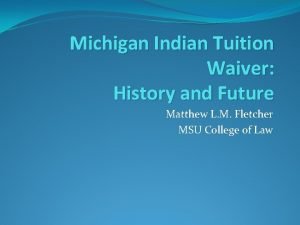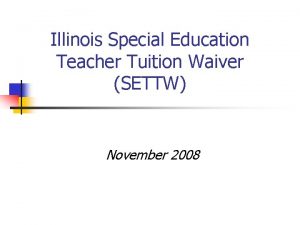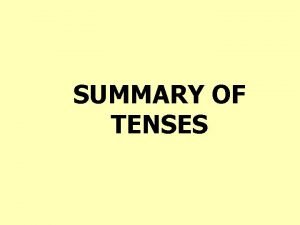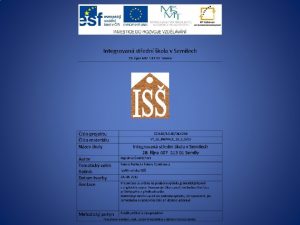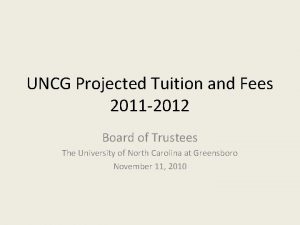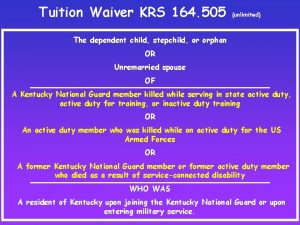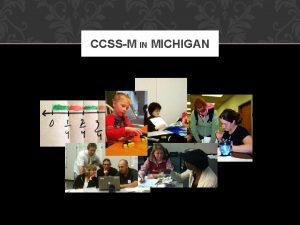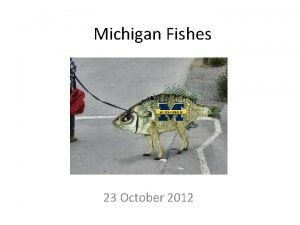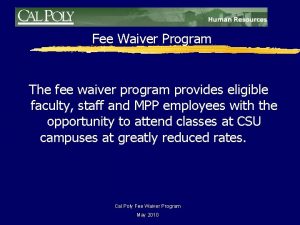Michigan Indian Tuition Waiver History and Future Matthew


















- Slides: 18

Michigan Indian Tuition Waiver: History and Future Matthew L. M. Fletcher MSU College of Law

Tuition Waiver Law (1976) �A Michigan public community college or public university … shall waive tuition for any North American Indian who qualifies for admission as a fulltime, part-time, or summer school student, and is a legal resident of the state for not less than 12 consecutive months. [MICH. COMP. L. § 390. 1251(1)]

1836 Treaty of Washington �Article IV: “Five thousand dollars per annum, for the purpose of education, teachers, schoolhouses, and books in their own language, to be continued twenty years, and as long thereafter as Congress may appropriate for the object. ”

1855 Treaty of Detroit �Article II – “Eighty thousand dollars for education purposes to be paid in ten equal annual installments of eight thousand dollars each, which sum shall be expended under the direction of the President of the United States; and in the expenditure of the same, and the appointment of teachers and management of schools the Indians shall be consulted, and their views and wishes adopted so far as they may be just and reasonable. ”

1934 Act of Congress �Be it enacted by the Senate and House of Representatives of the United States of America in Congress assembled, That there is hereby granted to the State of Michigan for institutional purposes the property known and designated as the “Mount Pleasant Indian School”, located at Mount Pleasant, Michigan, such grant to include the land buildings and such equipment as may be designated by the Secretary of Interior…. [48 Stat. 353 (Feb. 19, 1934)]

Two Provisos (Requirements) Provided, That this grant shall be effective at any time prior to July 1, 1934, if, before that date, the Governor of the State of Michigan on behalf of the State files an acceptance thereof with the Secretary of Interior…. 2. Provided further, That as a condition precedent to this grant Indians resident within the State of Michigan will be accepted in State institutions on entire equality with persons of other races, and without cost to the Federal Government. 1.

Comstock Acceptance �As Governor of this State, in accepting this grant, I acknowledge the condition that the State of Michigan will receive and care for in State institutions Indian residents within the state on entire equality with persons of other races and without cost to the Federal government. [May 28, 1934]

Correspondence re: High Island Ottawas �This law … provides that Indians should be accepted in State institutions on entire equality with persons of other races and without cost to the Federal Government. We interpret that to mean that public schools in Michigan shall not charge tuition for Indian pupils. [William Zimmerman to Fran Christy, October 29, 1934, CCF-Tomah 355741934: 310 (emphasis added)]

Correspondence re: Grand Traverse Indians �We are not overlooking the educational needs of Michigan Indian children although we think it is in their best interest to attend public schools, high schools, colleges and trade schools with members of other races than to establish separate schools for the Indians. Of course, under existing law providing for their education by the state, such separate schools would be impracticable…. [William Zimmerman to Albert J. Engel, November 11, 1935, CCF-General Services 45653 -1934: 806 (emphasis added)]

1977 Field Solicitor Opinion �[On the question of whether the State is obligated to provide services to Sault Tribe Indians] In Michigan, because of the commitment made by the state when the Mt. Pleasant Indian School was turned over to the state in 1934, all institutional costs for Indians are to be borne by the state. … The acceptance of this grant … specifically acknowledged the responsibility to provide institutional services to Indians without costs to the Federal Government. [Elmer T. Nitzschke to George V. Goodwin, April 22, 1977]

1978 Amendment – ¼ Blood Quantum �For the purposes of this act, “North American Indian” means a person who is not less than 1/4 quantum blood Indian as certified by the person's tribal association and verified by the Michigan commission on Indian Affairs. [MICH. COMP. L. § 390. 1252)]

Children of the Chippewa, Ottawa and Potawatomy Tribes v. Regents �In a pristinely humane world, it might be honorable and fair to compel defendant to offer comprehensive scholarships in gratitude for the 1817 conveyance. Certainly, the cost of higher education is subject to the rigors of inflation as are all other things and the Plaintiffs, like everyone else, could benefit by the financial assistance they seek. … Where, as here, the language of the treaty and the historical evidence reflect a gift inter vivos and nothing more, the imposition of a constructive trust is neither equitably nor legally desirable. [Mich. Court of Appeals 1/26/81]

1995 Crisis �Gov. John Engler has decided not to veto from this year's budget a program that pays college tuition for Native Americans. But he said this will be the program's last year. The $1. 4 billion budget for Michigan public universities and special programs was signed over the weekend and includes $3 million to support the Indian tuition waiver program. State tax money pays the tuition for about 2, 500 American Indians. Engler said he opposes the tuition waiver this year, but will not veto it because students and schools already have made plans counting on the money for this fall, said spokeswoman Pat Masserant. [Chi. Trib. 7/13/95]

Engler Loses Battle �Native American students at Michigan's 15 public universities will get tuition waivers this fall, even though it has not been determined who will pay the bills, a school president said. Lake Superior State University President Robert Arbuckle said his school decided Tuesday to offer the waivers this fall. That came despite Gov. John Engler's warning that the state would not continue funding for the program. Arbuckle said the other 14 public universities in Michigan also have decided to grant waivers this fall. About 2, 400 students use the waiver program. "I think the state is morally, legally and constitutionally bound, " Arbuckle said. "We will honor that commitment even if the state doesn't. " … University and tribal officials said the state promised tuition waivers in a treaty that gave Michigan land for some of its public universities. [Chi. Trib. 8/10/95]

Prop. 2 – Affirmative Action Ban �The University of Michigan, Michigan State University, Wayne State University, and any other public college or university, community college, or school district shall not discriminate against, or grant preferential treatment to, any individual or group on the basis of race, sex, color, ethnicity, or national origin in the operation of public employment, public education, or public contracting. [Mich. Const. art. I, sec. 26(1)]

Michigan Civil Rights Commission Response �Adopts tribal position paper in “One Michigan at the Crossroads: An Assessment of the Impact of Proposal “ (3/7/07): “This tuition waiver remains valid under Proposal 2 because it does not grant preferential treatment based on race, sex, color, ethnicity, or national origin. We conclude that because the United States Supreme Court has specifically held that tribal status is a political category based on the relationship between the federal government and the tribes as sovereign entities, it is a political classification, not a racial classification, and therefore does not violate Proposal 2. ” [at pp. 26 -27]

Mich. AG Declines to Opine

Future Challenges, Opportunities? �Continued funding challenges – Rep. Agema, for example � 2013/2018 – Gaming Compact Renegotiation �Linkage to Boxcheckers
 Michigan indian tuition waiver
Michigan indian tuition waiver Special education teacher tuition waiver
Special education teacher tuition waiver Frances downes
Frances downes Michigan tuition incentive program
Michigan tuition incentive program Future perfect and future continuous exercises with answers
Future perfect and future continuous exercises with answers Esercizi future continuous e future perfect
Esercizi future continuous e future perfect Michigan glacial history
Michigan glacial history See future continuous
See future continuous Tense chart
Tense chart Future plans and finished future actions
Future plans and finished future actions Future continuous
Future continuous Nulti i prvi kondicional
Nulti i prvi kondicional History of indian jewellery
History of indian jewellery Non-official compendia
Non-official compendia Item rate contract
Item rate contract Portland state university undergraduate tuition and fees
Portland state university undergraduate tuition and fees Holly franquet
Holly franquet Uncg tuition per year
Uncg tuition per year Prague chemistry university
Prague chemistry university
